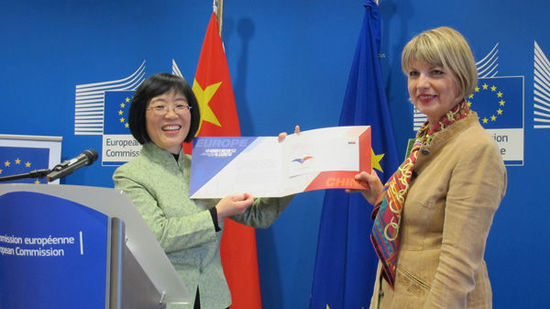Scholars: 'One Belt, One Road' good for China-EU ties

After 40 years of diplomatic relations, China and Europe are preparing to open a new chapter of cooperation through China’s “One Belt, One Road” initiative.
May 6 marks the 40th anniversary of the establishment of relations between China and Europe. For the past four decades, bilateral ties have matured in terms of scope, strategic influence and stability and will continue to further develop into a relationship characterized by peace, growth, reform and civilization.
Experts from China and abroad are saying the “One Belt, One Road” initiative is creating new opportunities for cooperation between the two powers.
Jiang Shixue, deputy director of the Institute of European Studies at the Chinese Academy of Social Sciences (CASS), said the areas of cooperation involved in the “One Belt, One Road” initiative, for the most part, have been covered by the China-EU 2020 Strategic Agenda for Cooperation.
Putting forth a range of ambitious goals for cooperation in nearly a hundred fields, the agenda serves as a blueprint for multi-faceted collaboration between China and Europe in such fields as spaceflight, aviation, anti-piracy, urbanization, energy and other sectors. “If each issue of cooperation could be implemented as planned, China-EU relations would advance by leaps and bounds,” Jiang said.
The “One Belt, One Road” initiative also advances the interests of the European development strategy, said Wang Mingjin, deputy dean of the School of International Relations and Diplomacy at Beijing Foreign Studies University.
As an example, he noted that in the end of 2014, EU came up with an investment plan of more than €300 billion to attract large sums of investment through small amounts of public funds. And this will provide opportunities for China to invest and finance projects in EU regions. Complementing each other, the EU investment plan and China’s “One Belt, One Road” will together create opportunities for closer cooperation between the two sides, Wang said.
China and EU have been dedicated to promoting multilateral cooperation, and the “One Road, One Road” initiative, as a multilateral strategic plan, will no doubt stimulate new multilateral mechanisms of development, which will, at the same time, make the current international organizations of the regions more open, Wang added.
Wu Zhicheng, dean of the Zhou Enlai School of Government at Nankai University, said Europe should take full advantage of China’s “One Belt, One Road” initiative and become its participant, promoter, builder and partner to comprehensively deepen the bilateral ties through joint discussion, construction and sharing.
Looking back on the year 1975, when China and Europe had just established their diplomatic ties, the annual bilateral trade volume was only $2.4 billion. But today, the average daily volume totals $1.5 billion. The EU has been China’s largest trade partner for 10 consecutive years, and China is the EU’s largest import market and the second-largest trade partner.
“The two are deeply interdependent on each other, and an economic slowdown and import reduction of either side will affect the other,” said Hans Dietmar Schweisgut, the EU ambassador to China, in the news release conference of the 40th anniversary of China-Europe diplomatic relations.
“For the EU and China, cooperation exceeds disputes in areas of global governance,” said Chen Yugang, a professor from the School of International Relations and Public Affairs at Fudan University. A case in point is that to jointly maintain world peace and stability, the two have made remarkable achievements through their cooperation in the security domain.
“In the escort operations in the Gulf of Aden, the interaction and coordination between China and the EU were the formulas for a success that exceeded the expectations of many observers,” Chen said. It has been such an effective international collaboration that piracy off the coast of Somalia has been reduced by 95 percent in the past two years, Chen said.
Mao Li is a reporter at the Chinese Social Sciences Today.
